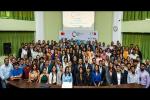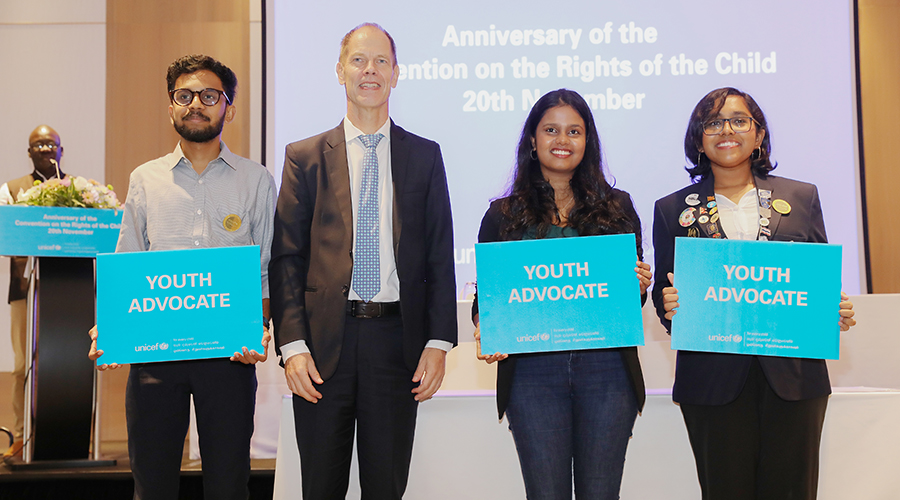The United Nations Convention on the Rights of the Child (CRC) was adopted as a promise to every child to protect and fulfil his/her rights.
The Convention recognizes that Childhood or being under 18, is a special moment in life for physical growth, play, learning and mental development.
The Convention is the most widely ratified human rights treaty in history and has over the years helped transform children´s rights around the world.
Sri Lanka was among the first countries to sign the Convention in 1990 and ratified it in 1991—committing to implement it and be held accountable.
Since then, Sri Lanka has made notable progress on child rights, including:
o Maintaining universal immunization
o Achieving near universal access to primary education—at 99 per cent
o Reduced and maintained low rates of children dying before their 5th birthday—at 11 per 1000 live births.
o Sustained over 88.5% access to safe drinking water.
These are just a few of several remarkable achievements the country has made in protecting children, including through the years of conflict, then Tsunami, COVID-19 and most recently, the economic crisis.
While we celebrate the progress, the CRC anniversary is also a moment to remind ourselves of the work that remains to be done:
Especially—
o According to the recent child Multidimensional Poverty in Sri Lanka, more than four out of every ten (42.2 per cent) children under 5 years are deprived or live in a household deprived in two or more basic rights related to health, education, adequate living standards, or early childhood development.
o As per the national assessment conducted by the Ministry of Education in 2021-2022, only 14% of Grade 3 students reached all essential learning competencies in literacy.
In numeracy, it was 15%. Yet these competencies form the foundation on which children build their knowledge and different skills for the future.
o Across Sri Lanka, there over 10,000 children in institutional care and detention living in conditions that fall far short of what they need to develop to their full potential.
Over 90% of these children have a family to go to and with the right support could return home.
o Children aged 16-17 are still judged as adults by the law and detained for long periods of time.
o Violence against children continues to stalk children at home, at school and in the community.
Given the economic hardships, there is a risk that cases of abuse will increase and at the same time, services will struggle to respond.
o A major tool for a country to address glaring gaps in child rights is the resources it allocates.
However, Education and Health budgets remain far below international benchmarks and clearly insufficient to sustain and accelerate progress.
According to estimates, in 2023, Sri Lanka invests 7.2 per cent of total government expenditure (international benchmark is 15 to 20 per cent) towards education, equivalent to 1.3 per cent of GDP (international benchmark is 4 to 6 per cent).
On health, the government allocates an estimated 7.3 per cent of its total government expenditure in 2023, or 1.4 per cent of GDP (international benchmark is 5 per cent to achieve Universal Health Coverage).
The writings are on the wall. Action, at speed, is required especially that threats confronting children continue to emerge at an alarming rate, including environmental disasters.
UNICEF calls for:
o Prioritization and increased spending on social sectors to avoid further deterioration of the situation of children, help them overcome the consequences of recent shocks, and put them on a viable path to grow and develop to their full potential.
Sri Lanka needs to spend smartly and investments in the youngest children yield the highest returns.
Evidence on child development and efficiency in public expenditures show the importance of the earliest years of children, with the first 1,000 days in a child’s life providing an unprecedented opportunity to support physical and cognitive growth.
Child benefits are an evidence-based and scalable policy that prevents poverty and supports child health, nutrition and education outcomes.
They can be progressively implemented, starting from programmes such as the pregnancy voucher for pregnant and lactating women.
o The country needs to take urgent steps to strengthen Foundational Learning now as a core base of human capital development for its future socio-economic development.
Evidence shows that as little as $10 to $15 can provide a child with remedial education and strengthen education systems to help ensure every child learns the critical foundational skills.
The Ministry of Education has developed a strategy (2023 – 2025) for implementing a comprehensive learning recovery programme for primary education in Sri Lanka and all nine provinces have developed costed action plans.
While these are encouraging steps, it is important these plans are adequately resourced, including funding and implemented effectively.
o Tackle all forms of violence against children:
Implement the Alternative Care Policy.
UNICEF urges the operationalization of the alternative care policy, which outlines a comprehensive range of alternative care options – primarily finding family solutions for all children and encourages reforming all formal structures that provide services for affected children.
Take urgent steps to ban and criminalize corporal punishment in all settings.
It is not acceptable, not beneficial for anyone, that although its use and harmful effects are known, in Sri Lanka, corporal punishment remains lawful—for parents and teachers to be physically and emotionally violent towards children in the name of discipline and correction.
o Finally, child rights must continue to be above every interest, including political.
Child rights can only be achieved if every citizen upholds them and takes decisions and actions based on the best interest of the child.
Sri Lanka has demonstrated its ability to be a champion for child rights.
It now has a choice. Inaction is not one of them.























